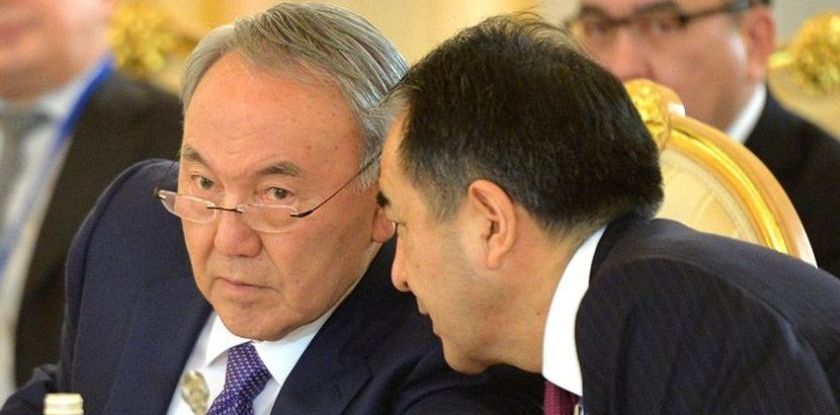As we demonstrate in “Nazarbayev’s Pyrrhic Victory and the State Policy Failure”, there are currently no drivers to stimulate and strongly influence the Kazakhstan economy and these drivers are unlikely to appear any time soon. With what, then, Kazakhstan must live at present?
It must live with a stagnating national economy. Even in the best-case scenario, it will only grow 1-2% annually. Even then, there is still a several year gap between the GDP increase and the improvement of the living standards for most of the Kazakhstanis. Moreover, we doubt that a 1-2% real income growth would satisfy the Kazakh citizens today.
Considering this, Akorda’s current policy oriented towards tightening the screws on domestic affairs seems the only effective and rational way for the ruling elite to survive. The problem is that no one knows what limits such a policy can have. People in Kazakhstan go out of their minds with anger. Consider, for one, the last year landmark terrorist attacks, a collective one in Aktobe and an individual one in Almaty. They are of a landmark nature indeed because they demonstrate there are now people in the country ready not just to kill but to die as well.
Nazarbayev’s attempts to kick start the economy by employing the unconnected, though often rational and timely, means cannot resolve the situation. It means that Kazakhstan is doomed to live through a period of “zastoi” (Era of Stagnation) not unlike the one from the Soviet times. The difference is that, in the Soviet Union, people had money and no possibility to spend it because of the commodity deficit. Nowadays, in Kazakhstan, the situation will be reversed.
If our prognosis is correct, the power shift from Nazarbayev to his successor (or, to be precise, a group of persons who will at first manage the state collectively) should happen without difficulty just as it was done in Turkmenistan and Uzbekistan.
We can also state with certainty that the current crisis in the political and social spheres will not end until a single leader separates out from the group of successors and ascends to power.
(Let us clarify what we mean when we speak about the smooth transition of power. We mean that there will not be any massive scale anti-government protests a la Ukrainian Maidan. We should not expect a riot or a revolution. As for repressions against individuals and family clans, they will certainly happen and will probably be quite brutal).
Then, the new leader will be caught in the same dilemma Nazarbayev is facing now. He will either be forced to continue pulling the wool over the citizens’ eyes or to try and attempt something to make the miracle happen.
And this is going to be the crucial matter. Will the Kazakh elite understand the tight connection between the economy and their policies? Will they realize that a competitive economy starts with competitive market players – be it an entrepreneur, an engineer, or a worker? Will they see the necessity of implementing political reforms? Will they have the courage to do it? Or, perhaps, cradled by the relative political stability, they will myopically try and continue Nazarbayev’s present course? In the first case, the country will enter yet another “perestroika”, in the second, we will go through yet another “zastoi” period.
To be fair, there is still a chance to prevent the zastoi from happening. To those who want to know more on the subject, we recommend the materials from the Gaidar Forum in Russia. Unfortunately, Kazakhstan does not have economic events of such level, scale, and quality. Still, the idea to implement successful, albeit individual, reforms, attract high-quality investments, start business projects, stimulate competition and innovation together with private saving accumulation and a large domestic market emergence is relatively correct and will eventually enable the government to change the economy.
This means that, following Russia’s footsteps, Kazakhstan may at least have a chance to succeed in the future by simply sticking to the neighbor. Of course, Russia, given that its authoritarian political system remains unchanged, itself has a minimal chance for competitive recovery. But this is another matter.
Another possibility is to cling to China. Judging by the recent agreements made between Nazarbayev and the Chinese government including the plans to transfer about fifty manufacturing plants to Kazakhstan, this scenario is more feasible but less executable for political reasons.
Now, when the hands of the current and the future leaders of the nation are tied by the objective factors and the subjective restrictions (never mind that the professionalism of the Kazakh elite does not stand up to scrutiny), the role of the state apparatus has increased dramatically. This apparatus is now producing the legislative acts that the Kazakh citizens hate so much. When these legislative documents solve individual problems, when they are initiated inside the individual government departments that lobby them successfully, the risk of mistake rises significantly.
This is exactly what we are observing presently. In the one hand, the Land Code amendments were quite sensible and seemed effective for attracting investors. However, eventually, they were blocked. The same is true for tightening the temporary registration regime. The time is ripe to legalize the rental market in Kazakhstan but the means to do it are still too narrowly departmental. As a Russian author Kozma Prutkov warned us a long time ago, “A specialist is like a gumboil, his fullness is one-sided”. Well, mistakes like these have been, are and will be much more dangerous than terrorist attacks.
In support of our argument, consider the repeated increases of vodka prices, the Pavlov ruble exchange project, the epoch-making investment programs and dozens of other relatively correct and sensible acts of the USSR government during its last years. These acts, eventually, led to a complete demise of the country when its citizens turned away from their state, calmly observed the collapse of the political system and then went to their national quarters with indifference.




